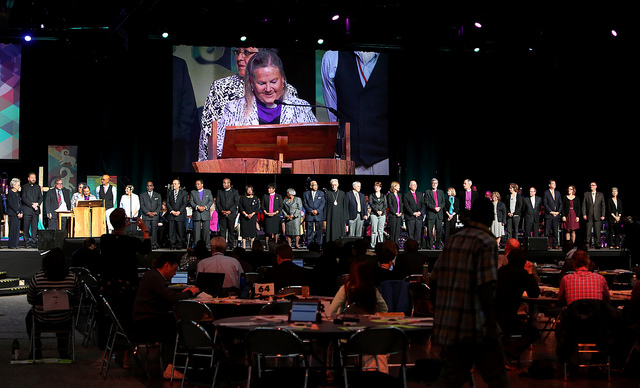Council of Bishops fully embraces role in ecumenical and interfaith concerns.
The United Methodist Council of Bishops announced today a plan to reorganize its current staffing structure to better align with the Council’s mission and vision and provide for a more efficient and collaborative team environment.
The plan would more fully integrate the work of the Council’s Office of Christian Unity and Interreligious Concerns, based in New York, and its staff in Washington D.C. Under the plan, all staff will be centralized and housed in the United Methodist Building in Washington, D.C.
“These changes should improve our ability to utilize our resources to their fullest potential and provide better support for the work of the global church,” said Bishop Bruce Ough, president of the Council.
Prior to January 2013, the denomination’s ecumenical and interfaith ministries were carried out by the General Commission on Christian Unity and Interreligious Concerns. The 2012 General Conference took action to consolidate those functions within the Council of Bishops by creating an Office of Christian Unity and Interreligious Relationships responsible for creating and strengthening relationships with other denominations to work toward unity and peace.
“This reorganization will complete this consolidation by more fully integrating these responsibilities with the Council’s other functions,” said Bishop Mike Watson, who will assume the role of ecumenical officer for the next quadrennium. “But it also signifies a change in philosophy toward how we execute the ecumenical and interreligious objectives of The United Methodist Church. The new structure will empower staff to work through the bishops as ecumenical leaders.”
Former Council president Bishop Warner Brown convened a task force of the Personnel Committee in the fall of 2015 to take a comprehensive look at how the organizational structure could better support the Council’s vision for the future, including more support for both residential and retired bishops.
As incoming Council president, Bishop Bruce Ough led the task force, which included Bishop Watson and Bishop Marcus Matthews, who becomes executive secretary for the Council September 1.
All of the eight current staff positions are being eliminated to make way for the new staffing model, which includes an ecumenical staff officer, an associate ecumenical staff officer, a chief administrative officer, an administrative assistant, an event coordinator, an accounting assistant, and a communication/special project specialist. The reorganization is not expected to incur additional costs.
The Council of Bishops will continue to rely on external support from its legal counsel, as well as the Council on Finance and Administration for large event planning and United Methodist Communications for strategic communications. They also plan to expand their relationship with the General Commission on Archives and History.
“As we prepare for this changeover and move, I want to thank all of our staff for their dedication and hard work,” said Bishop Ough.
Last Updated on June 6, 2016

